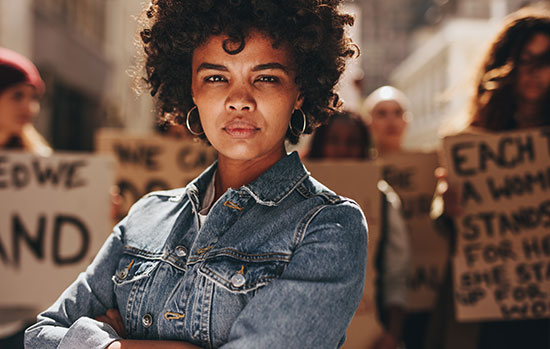
June 17, 2020 – Amidst a global pandemic keeping people apart, millions of people have come together in an historic movement that calls for fundamental and systemic change to social and criminal justice for African-Americans and other minority groups.
“What I am seeing and experiencing in our community is a lot of anger, a lot of sadness,” said Jacquelyn Hunt, who is a member of Madison’s African-American community and a licensed professional counselor at FOSTER of Dane County.
Hunt was part of a recent Racial Justice Summit hosted by Madison 365, along with other Black community members from Madison and Milwaukee, including Dane County Circuit Court Judge Everett Mitchell and former Madison Police Chief Noble Wray.
“People are tired,” Hunt said. “They have been wrestling with and been exposed to so much that their souls are now just weary and people are crying out.”
<iframe src="//www.youtube.com/embed/n665xGGEz-U" width="525" height="295" frameborder="0" allowfullscreen></iframe>
‘This is a Movement’
Massive protests erupted following the tragic May 25 death of George Floyd while a Minneapolis police officer pressed his knee against Floyd’s neck for more than eight minutes. Floyd’s death followed the March 13 death of Breonna Taylor, a 26-year old African-American medical worker fatally shot by Louisville police officers executing a no-knock warrant, as well as the death of Ahmaud Arbery in Georgia in February.
Arbery, a 25-year-old black man went out for a jog and was confronted by two white men, a father and son. Video footage later surfaced – prompting an arrest – that showed one of the men, identified as a former police officer, shoot and kill Arbery.
As protesting continues across America (and the world), people of all races are calling for justice and change, 57 years after the historic March on Washington (1963) to protest inequalities against African-Americans, which led to the Civil Rights Act of 1964.
“People have been referring to this as a protest. It's not a protest. This is a movement,” said Wray, former Madison police chief and former head of the Obama Administration’s Policing Practices and Accountability Initiative within the U.S. Justice Department.
“I lived through the 60s and it has that feel. Two things that jump out at me that represents that feel that this is not a protest, that it's bigger than that.”
First, Wray said, it’s worldwide. Second, “it is beyond the people that are asking for change.” That is, African-American communities are not the only ones protesting.
He noted an ABC/Ipsos poll that found 74 percent of Americans believed the George Floyd killing was a sign of broader problems in the treatment of African-Americans by police, versus an isolated incident. “It’s hard to get 74% of Americans to agree on anything,” he said. “It’s a movement … when you start to see a fundamental shift in the way that people think about a particular issue and we're starting to see that.”
Wray noted Lady Justice, the blindfolded woman holding a set of scales to symbolize justice as blind to bias and prejudice. “Justice is not blind,” Wray said.
“Justice can see, and we are seeing the results. Justice should be, and justice was intended to be blindfolded as a recognition that as human beings, we all have biases.”
“We have people in the system, not just police officers. We’ve got district attorneys, judges, the department of corrections – the whole system has a bias in it.”
Wray said the absence of tension is not justice, referencing words of Martin Luther King Jr. “We are lulled in between crisis to think everything is okay,” he said. “If crime is down we think everything is okay. If nobody is protesting, we think it’s okay. But it’s not.”
Judge Everett said “justice” is a verb. “We think of justice as a fixed state of being when in reality, it’s is a process by which we try to create what we want to see in the world.”
“We're waking up everybody and we're going to keep everybody woke until change that we want to see happens, and that's what our white allies need to understand.”
Watch the Racial Justice Summit.
You might also be interested in …
